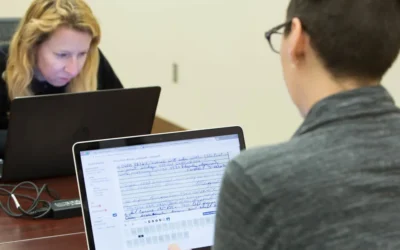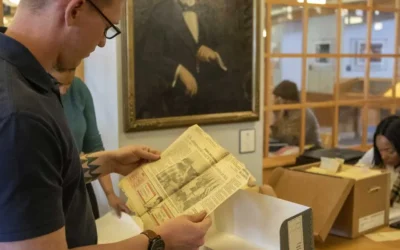Internal Advocacy in Archives
Margot Note
In an era of rapid technological advancements and data proliferation, the strategic preservation, accessibility, and management of archival holdings have become indispensable for modern enterprises.
Archival advocacy plays a pivotal role in addressing the challenges of the digital age.
As repositories of historical, cultural, and societal narratives, archives go beyond preservation. Archives offer a treasure trove of research opportunities illuminating the human experience’s intricacies. Advocacy elucidates the contribution of archival labor to a deeper understanding of an organization’s past.
Looking for Opportunities
In Many Happy Returns: Advocacy and the Development of Archives, Larry J. Hackman underscores the integral nature of advocacy in the core work of archives. He urges archivists to consider advocacy an essential function in daily operations. He highlights the proactive elements of advocacy, including influencing superiors, cultivating supporters, and seizing opportunities during successes and crises.
Hackman’s call for archivists is to become proactive risk-takers. The importance of developing an opportunity agenda aligns with the aspirations of the archives, even if it may contradict the objectives of the larger administrative unit. He encourages archivists to transcend traditional boundaries, pushing for initiatives that challenge the status quo.
Successful advocacy requires archivists to build relationships within their organizations and cultivate a network of supporters. Seeking out individuals whose support can help meet the needs of archivists is key. The role of relationships with decision-makers and the cultivation of a network enhances the influence of archivists.
Advocacy Trifecta
In guiding archivists toward successful advocacy, it becomes paramount to delve into the components of what can be aptly termed the “Advocacy Trifecta.” This trifecta is composed of essential elements that contribute to the effectiveness of advocacy efforts, fostering long-term, positive outcomes: goals, audience, and communication.
The foundation of the Advocacy Trifecta lies in archivists’ ability to set clear and strategic goals. These goals should align with the archives’ overarching mission and the institution’s broader objectives. Devising goals provides a roadmap for archivists, guiding their efforts and ensuring that advocacy initiatives are purposeful and impactful.
To engage in advocacy, archivists must understand their target audiences. This involves identifying the various stakeholders within and outside the organization who can influence the archival landscape. By tailoring messages to resonate with different audiences, archivists enhance the relevance and impact of their advocacy efforts.
Communication is at the heart of successful advocacy. Archivists must craft messages that convey the importance of archival work and resonate with their audience’s values and priorities. These messages go beyond promotion and foster a deeper appreciation for the archives’ role in preserving the institution’s history and contributing to its future.
The Advocacy Trifecta places a strong emphasis on a proactive approach to advocacy. Archivists are encouraged to take initiative, seek opportunities, and anticipate challenges. This stance ensures that advocacy becomes an ongoing and integrated aspect of archival operations rather than a sporadic or reactive endeavor. By adopting this approach, archivists can build sustained support for their cause.
Embedding Advocacy
As archivists reflect on the Advocacy Trifecta, it becomes evident that its principles extend beyond isolated strategies. Embedding advocacy is an integral and continuous part of archival work. Archivists are urged to assess how their work aligns with the broader goals of the institution, fostering a proactive mindset.
This perspective reinforces the idea that by positioning advocacy at the core of archival endeavors, organizations ensure the sustained preservation of valuable records and contribute to a deeper understanding of their history. It transforms advocacy from a standalone initiative into an inherent aspect of the archival ecosystem, where its influence permeates every facet of preserving, accessing, and managing archival holdings. In doing so, archivists promote positive change, shaping the narrative of their institutions for generations.
Margot Note
To learn more, please join us for a free webinar, Internal Advocacy Fundamentals for Archivists, Wednesday, February 14th 2024 at 11 a.m. Pacific, 2 p.m. Eastern. (Can’t make it? Register anyway and we will send you a link to the recording and slides afterwards). Register now.
Never miss another post. Subscribe today!
Similar Posts
Collaborative Archival Relationships
Collaborative projects are instrumental in showcasing how archival collections can benefit various organizational departments.
Informational, Evidential, and Intrinsic Values within Archives
Archives provide authentic, reliable information and hold values that reflect their functions and uses; informational, evidential, and intrinsic.
A Sustainable Archives
Archivists prioritize sustainable practices and policies, rooting their work in ethics of care, often preferring digital processing and preservation
Archival Branding and PR Strategies
Archivists who adopt branding and PR strategies both safeguard historical treasures and contribute to their organizations’ evolution.




Leave a Comment
Comments are reviewed and must adhere to our comments policy.
0 Comments